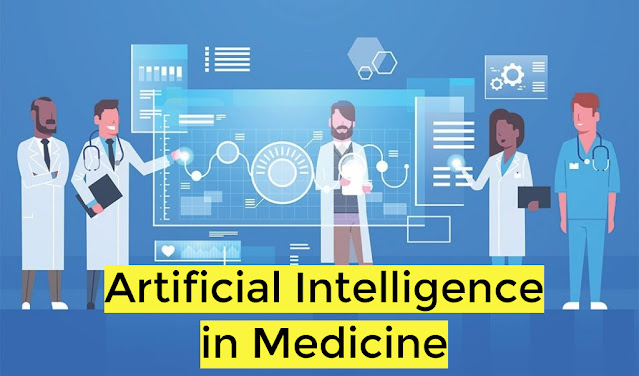How Artificial Intelligence is Revolutionizing Medicine
Artificial Intelligence (AI) has become a driving force behind revolutionary advancements in various industries, and one of the areas where it is making a significant impact is medicine. In this article, we'll explore how AI is transforming the field of healthcare, from diagnosis and treatment to medical imaging and administration.
Introduction to Artificial Intelligence (AI) in Medicine
AI refers to the simulation of human intelligence processes by machines, particularly computer systems. In medicine, AI is harnessed to analyze data, make predictions, and assist medical professionals in providing better patient care.
The Role of AI in Diagnosis and Disease Prediction
AI-Powered Diagnostic Tools
AI has given rise to diagnostic tools that can rapidly analyze patient data, symptoms, and medical histories. These tools assist healthcare providers in making accurate and timely diagnoses. For example, AI algorithms can analyze medical images, such as X-rays and MRIs, to detect abnormalities that might be missed by the human eye.
Predictive Analytics in Preventive Care
AI's ability to process vast datasets enables it to predict disease outbreaks and identify potential health risks in populations. This information is invaluable in preventive care and can help authorities allocate resources more effectively.
AI-Enhanced Treatment and Drug Discovery
Personalized Treatment Plans
AI can analyze patient data to create personalized treatment plans. This means tailoring medical interventions to individual patient needs, increasing the chances of successful outcomes. Personalized medicine is particularly beneficial in cancer treatment, where therapies can be optimized based on a patient's genetic makeup.
Drug Discovery Acceleration
AI accelerates drug discovery by analyzing vast chemical and biological datasets. This speeds up the identification of potential drug candidates, reducing the time and cost involved in bringing new medications to market.
Revolutionizing Medical Imaging with AI
Enhancing Radiology and Pathology
AI is transforming medical imaging, making radiology and pathology more precise. For instance, AI algorithms can help radiologists detect early signs of cancer, leading to earlier intervention and improved patient outcomes.
Early Detection of Diseases
AI can analyze patient data, such as electronic health records and wearable device data, to identify early warning signs of diseases like diabetes and heart disease. This early detection can significantly impact disease management and outcomes.
AI in Healthcare Administration and Patient Care
Streamlining Administrative Tasks
AI automates administrative tasks such as appointment scheduling and billing, allowing healthcare professionals to focus more on patient care. Chatbots and virtual assistants powered by AI can handle routine inquiries, improving the overall patient experience.
Improving Patient Care and Engagement
AI-driven tools can monitor patients remotely, ensuring they adhere to treatment plans and providing real-time feedback to healthcare providers. This not only enhances patient care but also boosts patient engagement in their own health.
Ethical Considerations and Challenges
Data Privacy and Security
The use of AI in medicine raises concerns about patient data privacy and security. It is crucial for healthcare organizations to implement robust data protection measures to safeguard sensitive patient information.
Ethical AI Use in Medicine
Ensuring that AI algorithms are unbiased and transparent is essential. The ethical use of AI in medicine means addressing issues related to bias in AI algorithms and ensuring that decisions made by AI align with ethical medical practices.
The Future of AI in Medicine
The future of AI in medicine is promising. AI will continue to evolve, making healthcare more accessible, efficient, and precise. It will play a pivotal role in personalized medicine, drug discovery, and disease prevention.
Conclusion
Artificial Intelligence is revolutionizing medicine by improving diagnosis accuracy, speeding up drug discovery, enhancing medical imaging, streamlining administrative tasks, and boosting patient care. However, ethical considerations and data security remain paramount as we harness the potential of AI in healthcare.
FAQs on AI in Medicine
1. Can AI replace doctors in the future? AI can assist doctors in diagnosis and treatment, but it is unlikely to replace human medical professionals entirely. AI is a tool to enhance healthcare, not replace it.
2. How is AI used in personalized medicine? AI analyzes patient data, such as genetics and medical history, to tailor treatment plans to individual patients, maximizing treatment effectiveness.
3. What are the ethical concerns with AI in medicine? Ethical concerns include bias in AI algorithms, data privacy, and ensuring AI decisions align with ethical medical practices.
4. How does AI enhance patient care and engagement? AI can monitor patients remotely, ensuring they follow treatment plans, and providing real-time feedback to healthcare providers, increasing patient engagement.
5. What is the future of AI in medicine? The future of AI in medicine includes continued advancements in personalized medicine, drug discovery, and disease prevention, making healthcare more accessible and efficient.

